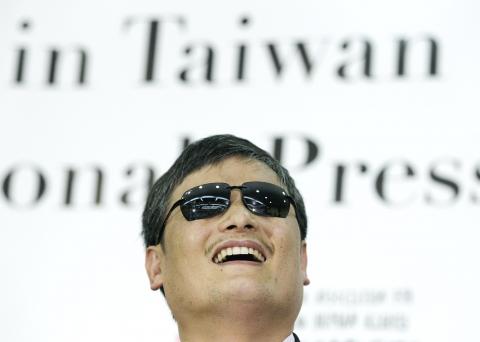Taiwan’s leaders appear to have a lack of understanding of “the essence of Beijing’s authoritarian regime,” despite Taiwan serving as a role model for democratic development in China, Chinese activist Chen Guangcheng (陳光誠) said in Taipei yesterday.
Chen, who has been living in the US after fleeing China in May last year, told an international press conference on the first full day of his 18-day visit to Taiwan, that President Ma Ying-jeou’s (馬英九) refusal to meet him “reflected the fierce competition between a democracy and an authoritarian regime.”
Legislative Speaker Wang Jin-pyng (王金平) also turned down the opportunity to meet the 41-year-old dissident during his visit, which has been dubbed as a “trip for human rights” by its main organizer, the Taiwan Association for China Human Rights.

Photo: Pichi Chuang, Reuters
Visiting Taiwan for the first time, the activist said the success of Taiwan’s democratic development has proven Beijing’s rhetoric that democracy is not suited for the Chinese world to be a lie that “couldn’t be more wrong.”
However, Chen expected Taiwan to stand firm on its democratic system and “engage more with China’s political leaders, but also with its rights activists because they represent the real voice of the people.”
Accompanied by members of his family and his mentor, New York University (NYU) law professor Jerome Cohen, Chen faced the press conference — which attracted more than 100 reporters, and included more than 40 international media outlets — with confidence.
He carefully handled more than 20 questions on various topics, such as his plans after finishing his fellowship at NYU, a suspected attempt to hack into his personal computer by Beijing and his observations on democracy in Taiwan, without undue elaboration.
Chen refrained from criticizing Taiwanese politicians or democratic developments in Taiwan and Hong Kong, which one reporter described as “eroding.”
“If Hong Kong fails to transplant the rule of law to China, Beijing will eventually bring the rule of man to Hong Kong. If Taiwan does not help democratize China, the authoritarian system of government will someday return to intimidate Taiwan,” Chen said.
With regard to his future, Chen said he does not rule out any possibilities, including where he would live, but said he is determined to fight the Chinese Communist Party regime, which imprisoned him between 2006 and 2008, and afterward placed him under house arrest.
Speaking with confidence, Chen said he would “definitely return to China” and that he believed he had done the right thing and “struck Beijing in its Achilles’ heel,” which is what caused it to retaliate so strongly against him.
Chen is scheduled to deliver a speech titled “Human rights as the foundation of cross-strait peace” at the Legislative Yuan and visit Jingmei Human Rights Memorial Park in the outskirts of Taipei today.
He is also scheduled to unveil his new book, titled China, the Book of Living and Dying, at a press conference in Taipei tomorrow.

AIR SUPPORT: The Ministry of National Defense thanked the US for the delivery, adding that it was an indicator of the White House’s commitment to the Taiwan Relations Act Deputy Minister of National Defense Po Horng-huei (柏鴻輝) and Representative to the US Alexander Yui on Friday attended a delivery ceremony for the first of Taiwan’s long-awaited 66 F-16C/D Block 70 jets at a Lockheed Martin Corp factory in Greenville, South Carolina. “We are so proud to be the global home of the F-16 and to support Taiwan’s air defense capabilities,” US Representative William Timmons wrote on X, alongside a photograph of Taiwanese and US officials at the event. The F-16C/D Block 70 jets Taiwan ordered have the same capabilities as aircraft that had been upgraded to F-16Vs. The batch of Lockheed Martin

GRIDLOCK: The National Fire Agency’s Special Search and Rescue team is on standby to travel to the countries to help out with the rescue effort A powerful earthquake rocked Myanmar and neighboring Thailand yesterday, killing at least three people in Bangkok and burying dozens when a high-rise building under construction collapsed. Footage shared on social media from Myanmar’s second-largest city showed widespread destruction, raising fears that many were trapped under the rubble or killed. The magnitude 7.7 earthquake, with an epicenter near Mandalay in Myanmar, struck at midday and was followed by a strong magnitude 6.4 aftershock. The extent of death, injury and destruction — especially in Myanmar, which is embroiled in a civil war and where information is tightly controlled at the best of times —

China's military today said it began joint army, navy and rocket force exercises around Taiwan to "serve as a stern warning and powerful deterrent against Taiwanese independence," calling President William Lai (賴清德) a "parasite." The exercises come after Lai called Beijing a "foreign hostile force" last month. More than 10 Chinese military ships approached close to Taiwan's 24 nautical mile (44.4km) contiguous zone this morning and Taiwan sent its own warships to respond, two senior Taiwanese officials said. Taiwan has not yet detected any live fire by the Chinese military so far, one of the officials said. The drills took place after US Secretary

THUGGISH BEHAVIOR: Encouraging people to report independence supporters is another intimidation tactic that threatens cross-strait peace, the state department said China setting up an online system for reporting “Taiwanese independence” advocates is an “irresponsible and reprehensible” act, a US government spokesperson said on Friday. “China’s call for private individuals to report on alleged ‘persecution or suppression’ by supposed ‘Taiwan independence henchmen and accomplices’ is irresponsible and reprehensible,” an unnamed US Department of State spokesperson told the Central News Agency in an e-mail. The move is part of Beijing’s “intimidation campaign” against Taiwan and its supporters, and is “threatening free speech around the world, destabilizing the Indo-Pacific region, and deliberately eroding the cross-strait status quo,” the spokesperson said. The Chinese Communist Party’s “threats